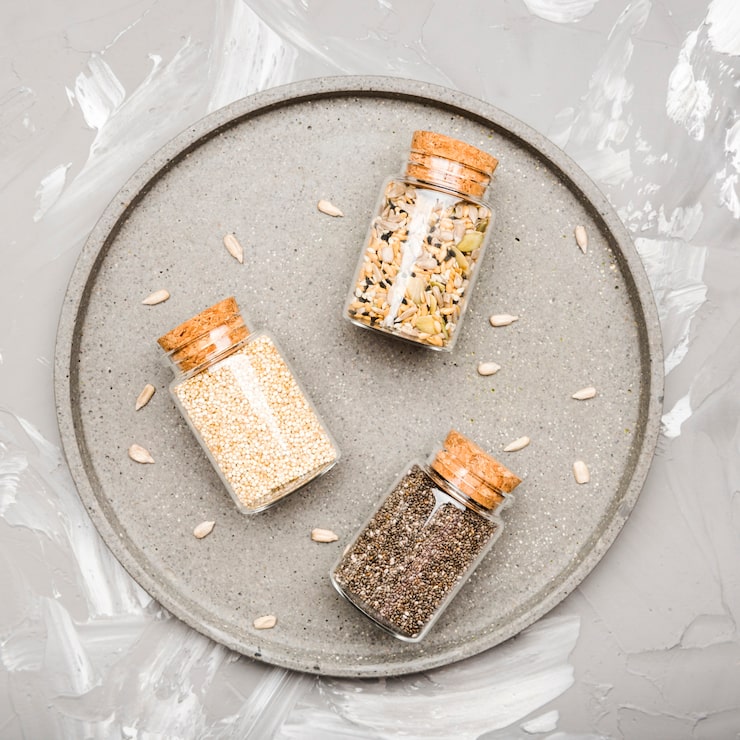I’ll be honest: I think fresh foods are usually healthier than their processed or powdered versions — and garlic is no different. Fresh herbs and spices tend to keep more antioxidants and vitamins than dried ones.
So what about garlic powder? I use it sometimes, but I prefer fresh garlic for its strong aroma and flavor. Fresh garlic is hard to beat. That said, garlic powder is a handy substitute when you don’t have fresh cloves. But does it offer the same benefits? I looked into it.

Is garlic powder good for you? Yes. It keeps many of the same health benefits as fresh garlic. Some nutrients are lost during processing, but garlic powder can still support heart health, fight harmful bacteria, reduce inflammation, and boost immunity. It’s a convenient, shelf-stable option you can add to your meals to help digestion and overall health.
How is garlic powder made? Fresh cloves are peeled and sliced, then dehydrated at low temperatures to keep as much flavor as possible. Once fully dried, the slices are ground into a fine powder. Drying removes moisture and extends shelf life, but it also causes some nutrient loss. Vitamin C, for example, is very sensitive to heat and light and is mostly lost in the process.
Allicin, the compound behind many of garlic’s health effects, is reduced by drying. But there’s a useful trick: allicin can form when garlic powder meets water. Garlic powder contains alliin, which converts to allicin when water activates the enzyme alliinase. So while it might not hit as hard as fresh garlic, you can still get some benefits when using it in dishes with moisture.
Garlic powder also keeps nutrients like vitamin B6, calcium, manganese, and various sulfur compounds, which give garlic its smell and contribute to its health effects. Fresh garlic is still the best, but garlic powder isn’t nutritionally empty — it just delivers its benefits a bit differently.
Health benefits of garlic powder
– Heart health: Garlic powder can help lower LDL (“bad”) cholesterol and may reduce the risk of plaque buildup. It may also help lower blood pressure — studies show it can reduce both systolic and diastolic numbers. Adding garlic powder to your diet can be an easy way to support your heart.
– Antibacterial effects: When mixed with water, garlic powder can produce allicin, which fights bacteria like Helicobacter pylori (linked to stomach ulcers) and foodborne bugs like Salmonella and E. coli. Other sulfur compounds in garlic powder also interfere with bacterial function, so it can help protect gut health and reduce foodborne risks.
– Anti-inflammatory properties: Garlic can lower markers of inflammation such as C-reactive protein (CRP) and tumor necrosis factor-alpha (TNF-α), which may help with conditions like arthritis. It doesn’t seem to reduce interleukin-6 (IL-6) as much, but it still lowers other key inflammation markers.
– Immune and antiviral support: Allicin may help block viruses from entering cells and prevent them from multiplying. Research suggests it may act against viruses like the flu, herpes, and even SARS-CoV-2. Garlic may also help you recover faster from colds and other infections. More studies are needed, but garlic powder can offer some immune support.
– Antioxidant protection: Garlic powder contains antioxidants that help neutralize free radicals, which can damage cells and contribute to aging and chronic disease. While dried garlic may have slightly fewer antioxidants than fresh garlic, it still contains compounds that protect cells.
– Digestive and gut health: Garlic compounds can help balance the gut microbiome by promoting beneficial bacteria and suppressing harmful ones like H. pylori. This balance can help prevent digestive problems and support overall gut health.
How it compares to fresh garlic
Fresh garlic has higher levels of allicin and vitamin C, so it’s a bit more potent. But garlic powder still provides many of the same benefits in a more convenient form. It’s a useful, shelf-stable alternative for supporting heart health, digestion, and immunity when fresh garlic isn’t available.
Possible side effects
Some people may get stomach upset from garlic, including heartburn, gas, or bloating — especially if they eat a lot or have a sensitive stomach. Garlic can also thin the blood, so check with your doctor if you’re on blood-thinning medications. Allergic reactions are rare but possible. In general, garlic powder is safe in normal cooking amounts; reduce intake if you notice problems.
Bottom line
Garlic powder may not have every nutrient found in fresh garlic, but it still offers many benefits. It’s a convenient way to add heart-healthy, immune-boosting, and digestion-supporting compounds to your meals. Whether you use it for flavor or health, garlic powder is a handy option when fresh garlic isn’t around.
More studies:
https://www.ncbi.nlm.nih.gov/pmc/articles/PMC2584604/
https://www.sciencedirect.com/science/article/pii/S1286457999800033